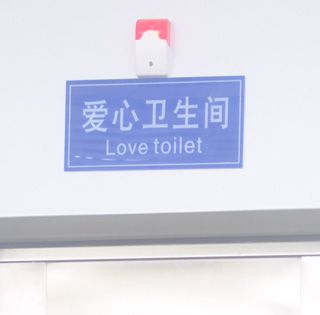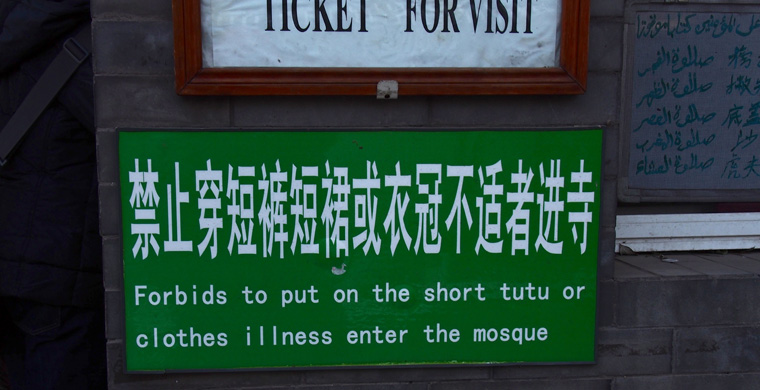Archive for Lost in translation
Thai fish estimates sea thicket is angry
On BoingBoing, Jason Weisberger posted this photograph under the title "Found Poem", but without any explanation:
Read the rest of this entry »
iPhone Math
The rumors are flying that Apple will introduce a new device called the "iPhone Math" in June of this year. Since that is a highly improbable name for an iPhone (is this going to be some kind of fancy calculator?), skeptical minds have been trying to find the source of the rumors. The earliest known occurrences of the expression "iPhone Math" are to be found in Taiwanese media, so one suspects that there was some sort of distortion of a hypothetical "iPhone Plus / iPhone +" (semantic garbling) or a hypothetical iPhone Max (phonetic garbling). After jumbled translation or transcription from English to Chinese, then back again into English, either of those names might conceivably have come out as "iPhone Math", which would indeed be a weird name for an iPhone.
Read the rest of this entry »
Once Bookstore
This beautiful establishment in Amoy (Xiamen) 厦门 (facing Taiwan across the strait that separates the PRC from the ROC) is perhaps the only pro-democracy (private) bookstore in the People's Republic of China — I applaud its moral courage. In this article about Once Bookstore, we find the following photograph of a sign in front of the store and the cover of a book that is most likely sold in it:

Read the rest of this entry »
Forbids tutu enter the mosque
Carley De Rosa sent in the following photograph taken at the Niujie (Ox Street) Mosque (Niújiē lǐbàisì; simplified 牛街礼拜寺, traditional 牛街禮拜寺) in Beijing:
Read the rest of this entry »
No word for "privacy" in Russian?
Reader and fan Will Thompson wrote to Mark Liberman, who passed his letter on to me, about a recent article by Ellen Barry in The New York Times, discussing a book by the Russian political analyst Nikolai V. Zlobin in which he explains weird/different American cultural norms to Russians.
Will notes that towards the end, the reviewer states:
He [Zlobin] devotes many pages to privacy, a word that does not exist in the Russian language[.]
And Will is suspicious of that claim.
Read the rest of this entry »
Turkey uteri
Last year in August, Valerie Syverson sent in a photograph taken at a storefront in Sydney's Chinatown that showed a package labeled "Bradysia homozygous". That sent me on a wild-goose chase, but eventually I was able to identify the product as leek turnovers and describe how the translation error had come about (see "Fungus gnat turnovers").
Now Valerie, who seems to get around the world, spotted the product in the following photograph in a Chinese grocery store in Ypsilanti, Michigan:

Read the rest of this entry »
"Pain Quotidien" and "Raid the Larder"
From a post entitled "Paging Victor Mair" on his blog, Karl Smith sent me the following photograph:
Read the rest of this entry »
Believed ham
PMW writes:
The recent menu posts on LL reminded me of a photo I took circa 2003 in a busy tourist spot on the Cote d’Azur, France. I’m not sure I’ve seen a sign in Europe with such a diversity of translation errors.
The menu describes a set of prix fixe alternatives, including for the first course
Read the rest of this entry »
Tape bacteria, risotto cowboy, burning denim, and better to die
Martyn Cornell sent in these entries of a menu from a cheap-and-cheerful “Italian” restaurant in North Point, Hong Kong run by local Chinese:
Read the rest of this entry »
Rendering "Pussy Riot" in Russian
With the international attention given to the trial and conviction of members of the Russian punk band Pussy Riot on charges of "hooliganism," many have wondered online whether Pussy Riot is a translation of a Russian name. But no: the band consistently uses Pussy Riot (in Latin characters) on its official LiveJournal blog, even though most of the text is in Russian (in Cyrillic characters). This isn't too surprising among punk/alt-rock bands worldwide. Whether it's the Japanese noise rockers Boredoms or Russian ska-punks Distemper, musicians very often use English in Latin script for the names of their bands (and titles of albums and songs), even when their lyrics are in their native language. But how have Russian sources identified Pussy Riot?
Read the rest of this entry »
Dinosaurs, baboons, and science journalists
It is well known within organic chemistry circles that there is a very strong bias toward L rather than D homochirality in the structure of earth's organic compounds. A recent paper offered a speculation about a possible explanation of the bias:
If there was … right circularly polarized light with energy in the uv or higher irradiating the asteroid belt when the amino acids were present on a particle that later came to Earth, this could account for the small excesses of the L anantiomers seen in the α-methyl amino acids.
And what did the PR/media machine do to make news out of this finding? The headlines ultimately mutated as far as this:
Claim: Advanced dinosaurs may rule other planets
Read the rest of this entry »
Permalink Comments off
An unexpected ingredient
Reader CM writes:
Last Sunday I went to a cafe in central Wiesbaden. In Germany, some ingredients have to be declared on restaurant menus. This is usually done via footnotes, with a key on the last page. That's what was done on this cafe's menu, and the footnotes in German were completely unremarkable:
But the English version of the footnotes delivered a wonderfully weird little surprise:
Read the rest of this entry »





